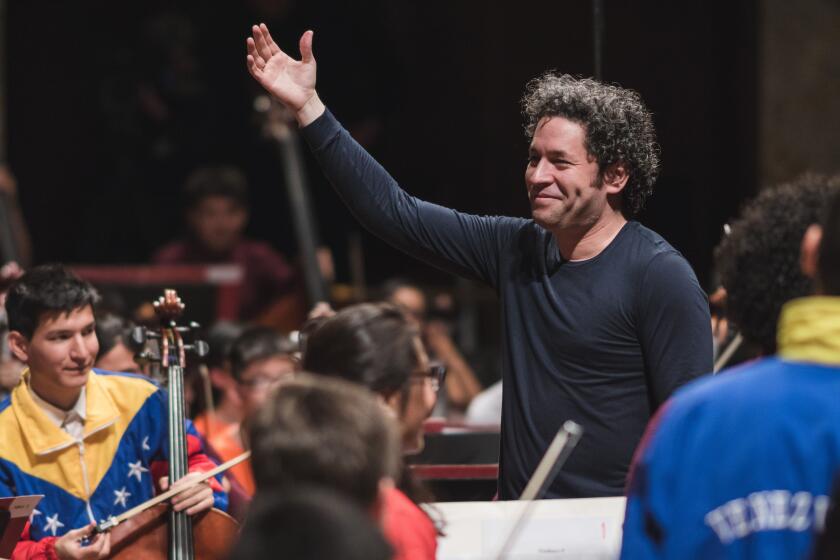TV Brought Him Fame, but the Play Is the Thing : Greg Mullavey Stages Drama on Prejudice
- Share via
Television may be where Greg Mullavey earns his money, but theater is what gets his juices going.
On Thursday, his production of L. Nathaniel Wolfe’s “Sweet Victory” opens at the Burbank Theatre Guild. “It’s a true story,” said the actor, who may be best remembered as Louise Lasser’s husband on the 1970s series “Mary Hartman, Mary Hartman.” Set in 1925, the action centers on Dr. Ossia Sweet, a black obstetrician who moves his family into a middle-class white neighborhood in suburban Detroit.
“During the day, a couple of curiosity seekers” gather outside,” said the producer. “By evening there’s a couple hundred of them. They start throwing rocks. The police are called, but nothing’s done. Inside, the family’s struggling to lead a normal life, but finally they have to confront what is going on outside.” Shots are fired from the house; a white man in the crowd is killed. The entire Sweet family is arrested for murder.
“Clarence Darrow defends them,” the actor continued. “This was his last trial of any significance--right after the Scopes monkey trial. In some ways, it was just as significant. Never in the history of the American judicial system had a black person gotten off after killing a white. But Darrow gets them off; they are acquitted by a white jury.”
The actor sighed. “The specter of prejudice lingers on. Not too long ago, there was a cross-burning on a black person’s lawn. They chose to leave. But Sweet would not be driven out.”
When the project originally came up, Mullavey (co-artistic director at the Burbank Theatre Guild with Gary Blumsack) had thought to direct it, but later chose Allan Rich. “I thought he was the perfect director for it,” the actor said. “He’d been under fire from McCarthy’s committee, blacklisted in 1952. So he brings a special sensitivity to this kind of play. Actually, I felt he had more passion for it than I did.”
Mullavey also has his hands full with another stage role, playing opposite Allen Garfield in Dennis Manuel’s “Pops” (opening April 27), a co-production of the Burbank Theatre Guild and Armina Shepherd at the Richmond Shepherd Theatre in Hollywood.
“It’s like ‘A View From the Bridge,’ only more intense,” he said. “The story’s about a father and son--and the son’s becoming like the father, even though he doesn’t want to be. The father--he’s like the local mob--runs a whorehouse. The mother has left. . . . Actually we find out that he’s sold her to a friend. I play his sidekick, a real seamy guy. It’s a part I’d never played before. I’m not right looks-wise, but I really wanted to do it. I even auditioned for them to prove that I could.”
The stage work, Mullavey said, has served as a welcome retreat from the emotional slings and arrows of the commercial arena.
“It used to be if I didn’t get a studio job, it was the end of the world. I’d be a basket case, devastated for two weeks. My sanity’s a lot better now--and that’s because of theater. Doing it takes the edge off everything else. It gives me a place to put my creative energy. Even though I don’t get paid, it’s worth it. It’s also turning out great for other things: inspiring me to write stuff, to say something.”
Mullavey just completed one such project, a proposed sitcom he wrote with daughter Allison, 14, the product of his 18-year marriage to actress Meredith MacRae (the daughter of Gordon and Sheila MacRae).
“Did she have a normal growing up?” the actor asked rhetorically. “I don’t think so. People have come and gone in her life too much. And unfortunately, her mother and I are going through a divorce, which is not terribly terrific. I wish it hadn’t happened. But people want what they want. They want to change and you say OK. I was miserable about it for a year; I’m better now. But it takes awhile, longer than you’d think.”
Born in upstate New York, Mullavey moved to Los Angeles when the Dodgers did--his father was the team’s first base coach. Although he majored in philosophy at UCLA, it was acting that consumed him. “I got rich for a while,” he said of his early successes. “I was making a lot of money--and I still can, if I get the right break. I had four series: ‘Mary Hartman, Mary Hartman,’ ‘Forever Fernwood,’ ‘Number 96’ and ‘Rituals.’ ” He shrugged. “And that was that.”
Not necessarily. A decade after “Mary Hartman,” Mullavey admits that people still recognize him from the show. “All the time,” he said bemusedly. “It’s amazing. Do I mind? Nah, it’s fine. I’m very philosophical about things like that. One has one’s day in the sun, I guess. And that was mine--so far.”
More to Read
The biggest entertainment stories
Get our big stories about Hollywood, film, television, music, arts, culture and more right in your inbox as soon as they publish.
You may occasionally receive promotional content from the Los Angeles Times.










